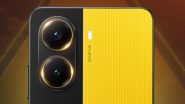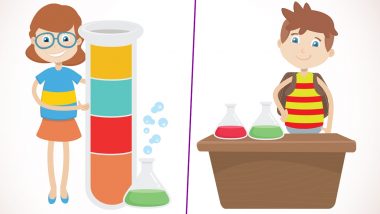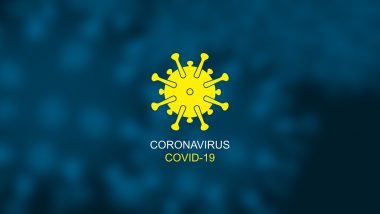The Coronavirus quarantine and lockdown has forced almost everyone around the globe to stay indoors. While it is easier for the adults, since they know the repercussions of going out, it is difficult to make kids understand. The children may be definitely enjoying these long holidays but they want to go out to play. So the searches for "how to keep kids busy during quarantine" have grown a lot in the past few days. One related search on Google is home experiments for kids. Come to think of it, trying easy science experiments at home is a great way to keep the children not only busy but also cater to their inquisitiveness. Besides, through each experiment, you can teach them some lessons from science and make it interesting for them. But if you are wondering what kind of experiments to do, let us help you out. We give you a few easy science experiments that can be done at home. 69-Year-Old Physics Professor's Cool Experiments Go Viral After Student Records and Uploads Videos.
1. Making Eggs Float
One of the very easy experiments you can start teaching your kids is about the density of substances. All you need is a wide-mouthed glass which can fit in an egg, some water and salt. Tell your kids to observe how an egg sinks in normal water, but when you add some salt in water, the egg floats. If it does not then add some more salt. Adding salt to the water increases the density of the solution because the salt increases the mass without changing the volume very much. You can teach your kids about buoyancy. Google 3D Animals Brings Giant Panda, Lion, Penguin, Tiger to Your Home Amid The Lockdown, So You Are No More Alone in Quarantine! Know Steps How to View It in Your Space.
Watch Video of This Easy Experiment Here:
2. Upside Down Water
Also called as the floating water experiment, this trick teaches about air pressure. It is extremely easy because you need just a glass of water and a thick sheet of paper. And it can be really surprising to see water not fall down and the reason is air. The explanation is, the air pushing up from underneath the paper is strong enough to stop of the water from pushing the card down pressure. Just ensure, the paper is thick and bigger than the mouth of the glass.
Watch Video of This Easy Experiment Here:
3. Fizzing Lemonade
This is one of the edible science experiments, where you can also get the kids interested in the kitchen. You can teach them about chemical reactions between an acid and a basic component. The chemical reaction will produce a lot of carbon dioxide (CO2) bubbles and prepare a fizzy drink. All you need is lemons/lemon juice, baking soda, water and sugar. The reaction is called carbonation.
Watch Video of How to Make Fizzing Lemonade Here:
4. Homemade Lava Lamps
This is one of the coolest experiments which your kids will definitely enjoy and of course, show it off to their friends later. They will make their own beautiful lamps and it will also teach them about liquid density, why oil and water don't mix and polarity of these substances. All you need is empty bottles, food coloring, vegetable oil and fizzing tablets. Watch a video below to know how to go about it step by step.
Watch Video of This Easy Experiment Here:
5. Make Rain Clouds at Home
You can teach your kids the process of evaporation and formation of clouds while you are sitting at home. All you need is some hot water, a jar and some ice. You can form clouds at home! It is a nice experiment to teach your kids how the clouds are formed and the changes in weather.
Watch the Video Here:
6. Pepper and Water With Soap Experiment
This is a very beautiful experiment which you should try especially now, to highlight the importance of washing hands. All you need is water in a plate, ground pepper powder and a pinch of soap. You can teach them about surface tension and to demonstrate how soap affects the surface of water. Because pepper is light it initially just floats in the water. When you add dish soap, the surface tension is lowered causing the bulging of the water, so the pepper floats aside with the drop of soap just in centre.
Watch the video here:
These are some of the easy experiments which you can try at home to give your kids some lessons of basic science. These experiments do not need a lot of material but ensure you are always supervising the children around. Science can be very interesting if taught in practical ways. So make good use of the holidays and teach your kids how science can be amazing.
(The above story first appeared on LatestLY on Apr 15, 2020 02:10 PM IST. For more news and updates on politics, world, sports, entertainment and lifestyle, log on to our website latestly.com).













 Quickly
Quickly




















